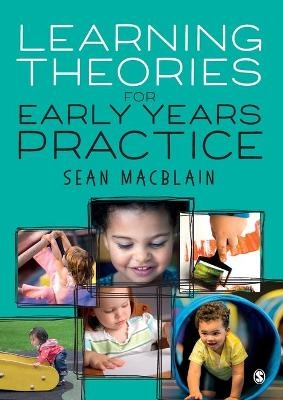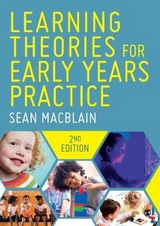
Learning Theories for Early Years Practice
SAGE Publications Ltd (Verlag)
978-1-5264-3209-4 (ISBN)
- Titel erscheint in neuer Auflage
- Artikel merken
Understanding and applying learning theories is crucial to the transition from study or training, to practice in a real-world setting. This new textbook will prepare the reader by demonstrating how key learning theories pan out in practice, with the aid of photographs, examples and clear explanations. Divided into three main sections, Early Influences, Modern Influences, and Challenges for Theorists in a Changing World, this author identifies the key theorists in early childhood, past and present, before linking them to the main issues and developments that face early years practitioners today. An explanation of each key theorist is guided by a clear structure, including:
links to other theorists
strengths and weaknesses of the theory
the theory in practice
Packed full of case studies, activities, points for discussion, extended and recommended reading, this is a fantastic resource for students and teachers who want to build a strong foundation in learning theories, to enable them to support the young children in their care as effectively as possible.
Sean MacBlain PhD is a distinguished author and academic whose publications include: MacBlain (Sage, 2021) Children’s Learning in Early Childhood; MacBlain (Sage, 2020) Child Development for Teachers; MacBlain, Dunn and Luke (Sage, 2017) Contemporary Childhood; Gray and MacBlain (Sage, 2015) Learning Theories in Childhood; MacBlain, Long and Dunn, (Sage, 2015) Dyslexia, Literacy and Inclusion: Child-centred Perspectives; MacBlain (Sage, 2014) How Children Learn. Sean’s publications are used by students, practitioners and academics throughout the world and have been widely translated including into Chinese and Vietnamese. Sean was previously a senior academic at the University of St Mark & St John, Plymouth, England where he held the positions of Research lead for the Centre for Education and Applied Research, Research Lead for the Centre for Professional and Educational Research, Research Coordinator for the School of Education and Deputy Chair of the Ethics Committee. Sean has also worked as a Senior Lecturer in Education and Developmental Psychology at Stranmillis University College, Queen’s University Belfast. In addition to this, Sean has worked for over twenty years as an educational psychologist and continues in this field as an independent practitioner.
Chapter 1: Introduction
Part 1: Early Influences
Chapter 2: John Locke and the Emergence of Empiricism
Chapter 3: Jean-Jacques Rousseau and the Concept of ‘Child’
Chapter 4: Johann Pestalozzi and the Importance of Nature
Chapter 5: Friederich Froebel and the Importance of Play
Chapter 6: Rachel and Margaret McMillan and Social Reform
Chapter 7: Sigmund Freud and the Psychodynamic Tradition
Chapter 8: Rudolf Steiner and the Changing Needs of Children
Chapter 9: Maria Montessori: The Environment and Learning
Part 2: Modern Influences
Chapter 10: John Dewey and Child-Centred Education
Chapter 11: Burrhus Skinner and the Behaviourists
Chapter 12: Jean Piaget: An Enduring Legacy
Chapter 13: Lev Vygotsky: Learning and Social Constructivism
Chapter 14: Albert Bandura and Social Learning Theory
Chapter 15: Urie Bronfenbrenner and Learning in Context
Chapter 16: Jerome Bruner and Constructivism
Chapter 17: Howard Gardner and Theories of Multiple Intelligence
Chapter 18: Reuven Feuerstein and Instrumental Enrichment
Chapter 19; Nel Noddings and the Ethics of Care
Chapter 20: Te Whariki
Chapter 21: Loris Malaguzzi and Reggio Emilia
Part 3: Challenges for Theorists in a Changing World
Chapter 22: The Realities of Childhood Today
Chapter 23: Emotional Intelligence
Chapter 24: How Children Play
Chapter 25: Forest Schools
Chapter 26: Learning and the Brain
Chapter 27: The Emergence of Digital Learning
| Erscheinungsdatum | 24.07.2018 |
|---|---|
| Verlagsort | London |
| Sprache | englisch |
| Maße | 210 x 297 mm |
| Gewicht | 370 g |
| Themenwelt | Sozialwissenschaften ► Pädagogik ► Vorschulpädagogik |
| ISBN-10 | 1-5264-3209-9 / 1526432099 |
| ISBN-13 | 978-1-5264-3209-4 / 9781526432094 |
| Zustand | Neuware |
| Haben Sie eine Frage zum Produkt? |
aus dem Bereich



